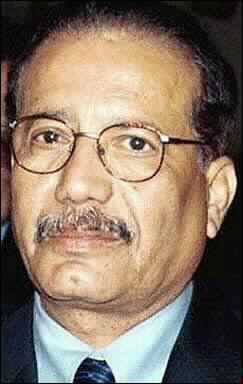Yemen received a massive fund injection to combat poverty and terrorism in a move that coincided with its confirmation that an attack had caused a blast on a tanker off its coast. The World Bank said Thursday it had accorded Yemen an assistance package of grants and loans worth 2.3 billion dollars to support an anti-poverty campaign running from 2003 to 2005. The bank underlined the link between poverty and terror in the announcement made at a donors' meeting in Paris.
On Wednesday, Interior Minister Rashad al-Alimi admitted that the blast that crippled the French supertanker Limburg two weeks ago was caused by an attack similar to the October 2000 USS Cole bombing attributed to the al-Qaeda terror network.
But despite the threat of attacks that might target oil supplies in the case of a war on Iraq, the Algerian and Iranian oil ministers said Sunday at a meeting in Doha that OPEC was unlikely to boost output in 2003.
However, the cartel's president, Rilwanu Lukman of Nigeria, on Monday renewed the pledge that OPEC will make up for the likely interruption of Iraq's production in case of a war.
The threat of a US-led war on Iraq has had so far a mixed impact on the region. It has depressed the stock markets, but the rising oil prices have given a boost to the Gulf states' budgets.
Saudi Finance Minister Ibrahim al-Assaf said Saturday the kingdom, the world's top oil exporter, expected to end the current year with a smaller budget deficit than the huge 12 billion dollar gap initially forecast.
Tehran's newspaper Kar-O-Kargar said Thursday that the Iranian budget has recorded a 1.5 billion dollar surplus because of the oil prices.
In more good news for Iran, Agriculture Minister Mahmud Hojjati announced Sunday a boom wheat harvest of 8.6 million tonnes that will cut wheat imports by 50 percent.
On the gas front, Abu Dhabi-based Dolphin Energy Ltd. (DEL) said Tuesday it will seal by December sales price agreements with Emirati customers, a crucial factor in its multi-billion-dollar pipeline project in the Gulf.
The Dolphin project, estimated at an overall cost of up to 10 billion dollars, aims to create a regional grid exporting gas by undersea pipeline from Qatar to the United Arab Emirates, Oman and eventually Pakistan.
Also in the UAE, British Petroleum announced Tuesday it has signed with Abu Dhabi Gas Liquefaction Co. (ADGAS) an agreement to buy up to 750,000 tonnes per year of liquefied natural gas from January 2002 to December 2005.
In the Mediterranean region, Egyptian Liquefied Natural Gas (ELNG) announced Monday it has finalised a contract with Gaz de France to supply the French company with liquefied natural gas over 20 years.
The contract also gives Gaz de France a five percent stake in ELNG, with BG holding 35.5 percent, Italy's Edison International 35.5 percent, and state-run Egyptian Natural Gas Holding Company (EGAS) and Egyptian General Petroleum Company (EGPC), 12 percent each.
In corporate news, Egypt's Orascom Telecom Holding (OTH) has begun a financial overhaul to improve cash flow and maintain its ambition to become the leading GSM operator in the Middle East, Africa and the Indian sub-continent.
OTH announced it sold part of its stake in Tunisian GSM operator OTT to Kuwait's Wataniya Telecom, two weeks after selling its assets in Yemeni operator Sabafon to the local Al-Ahmar Group.
PHOTO CAPTION
Yemeni Prime Minister Abdel Kader B
- Author:
& News Agencies - Section:
WORLD HEADLINES


 Home
Home Discover Islam
Discover Islam Quran Recitations
Quran Recitations Lectures
Lectures
 Fatwa
Fatwa Articles
Articles Fiqh
Fiqh E-Books
E-Books Boys & Girls
Boys & Girls  Women
Women










